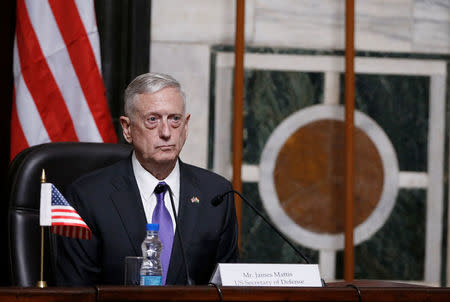Mattis plays down split between Trump, Tillerson on North Korea

By Phil Stewart and Idrees Ali WASHINGTON (Reuters) - U.S. Defense Secretary Jim Mattis on Tuesday played down an apparent split between the U.S. president and his top diplomat over outreach to North Korea, saying America's focus was still on finding a diplomatic solution to the dispute with Pyongyang. President Donald Trump, who has traded insults and threats with North Korean leader Kim Jong Un in recent weeks, said on Sunday Secretary of State Rex Tillerson was "wasting his time" trying to negotiate with North Korea over its nuclear weapons program. Tillerson, during a trip to China on Saturday, said the United States had direct channels of communication with the North and was probing Pyongyang to see if it was interested in dialogue. He expressed hope for reducing tensions with North Korea, which is fast advancing toward its goal of developing a nuclear-tipped missile capable of hitting the U.S. mainland. "I do not see the divergence as strongly as some ... have interpreted it," Mattis said. Both Mattis and Marine General Joseph Dunford, chairman of the Joint Chiefs of Staff, broadly backed Tillerson's efforts as they testified at the hearing before the Senate Armed Services Committee. "President Trump's guidance to both Secretary Tillerson and me has been very clearly that we would ... pursue the diplomatic effort to include with the various initiatives with China," Mattis told a Senate hearing. "I believe that Secretary Tillerson is accurately stating that we are probing for opportunities to talk with the North. All we're doing is probing. We're not talking with them, consistent with the president's dismay about not talking with them before the time is right." Trump has vowed to halt North Korea's nuclear ambitions and tensions have escalated in recent months, with Pyongyang conducting its sixth and largest nuclear test on Sept. 3. It has also threatened to test a hydrogen bomb over the Pacific. Dunford, the top U.S. military officer, strongly backed Tillerson's efforts to tighten an economic squeeze on North Korea. The international community's sanctions will need to be strong enough to convince Kim he cannot survive in power unless he changes course, he said. Dunford said Kim sees possession of ballistic missiles and a nuclear capability as inextricably linked to regime survival, adding: "What I think Kim Jong Un needs to realize is that he cannot survive with ballistic missiles and nuclear weapons because the international community will not allow him to survive." Dunford said Kim was particularly sensitive to the flow of oil into North Korea, saying when there has been a cut-off in the past "there's been a change in Kim Jong Un's behavior." "The fact is he needs economic resources external to the country to survive," he said. MISCALCULATION RISKS U.S. Senator Jack Reed questioned whether some degree of communication was vital between Washington and Pyongyang, given the risks of miscalculation by either side that could lead to conflict. Mattis suggested that the Trump administration was exploring a host of ways to influence the North, including through diplomacy. "I think the president dispatching Secretary Tillerson to Beijing here within the past several days to carry messages and to look at the way we can work with them is the most accurate answer to your question, that in fact this is part of a whole ... integrated effort that we have underway right now," Mattis said. It was not the first time the White House and State Department have seemed at odds on policy issues, but the White House has said Trump still had confidence in Tillerson. Trump has vowed to halt North Korea's nuclear ambitions and tensions have escalated in recent months, with Pyongyang conducting its sixth and largest nuclear test on Sept. 3. It has also threatened to test a hydrogen bomb over the Pacific. The fate of Americans held in North Korea is also a bone of contention. The Trump administration has demanded North Korea release three U.S. citizens it has detained: missionary Kim Dong Chul and academics Tony Kim and Kim Hak Song. The Trump White House and State Department have taken divergent stances on other foreign policy issues. When a dispute over Qatar erupted this year, Trump strongly backed Gulf Arab leaders who accuse Qatar of supporting Iran as well as Islamist militants. Trump accused Qatar of being a "high-level" funder of terrorism even as the Pentagon and Tillerson cautioned against the military, commercial and humanitarian effects of a boycott imposed by Arab states. Months into the dispute, Trump adopted a position more in line with that of the State Department. (Reporting by Phil Stewart and Idrees Ali; Editing by Chizu Nomiyama and James Dalgleish)

